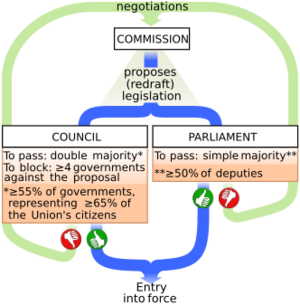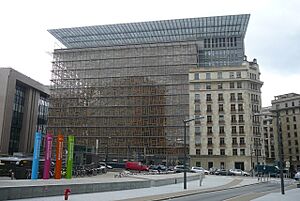Council of the European Union facts for kids
Quick facts for kids Council of the European Union
|
|||||||||||||||||||||||||||||||||||||||||||||||||
|---|---|---|---|---|---|---|---|---|---|---|---|---|---|---|---|---|---|---|---|---|---|---|---|---|---|---|---|---|---|---|---|---|---|---|---|---|---|---|---|---|---|---|---|---|---|---|---|---|---|
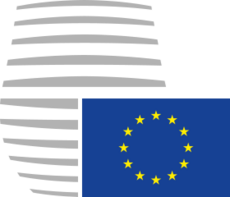 |
|||||||||||||||||||||||||||||||||||||||||||||||||
| History | |||||||||||||||||||||||||||||||||||||||||||||||||
| Founded | 1 July 1967 | ||||||||||||||||||||||||||||||||||||||||||||||||
| Preceded by | |||||||||||||||||||||||||||||||||||||||||||||||||
| Leadership | |||||||||||||||||||||||||||||||||||||||||||||||||
|
Presidency
|
|||||||||||||||||||||||||||||||||||||||||||||||||
|
Secretary General
|
Thérèse Blanchet, Independent
Since 1 November 2022 |
||||||||||||||||||||||||||||||||||||||||||||||||
|
Kaja Kallas, ALDE
Since 1 December 2024 |
|||||||||||||||||||||||||||||||||||||||||||||||||
| Structure | |||||||||||||||||||||||||||||||||||||||||||||||||
| Seats | 28 | ||||||||||||||||||||||||||||||||||||||||||||||||
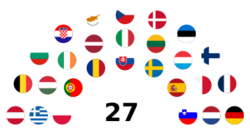 |
|||||||||||||||||||||||||||||||||||||||||||||||||
| Committees |
10 configurations
Agriculture and fisheries
Competitiveness Economic and financial affairs Education, youth, culture and sport Employment, social policy, health and consumer affairs Environment Foreign affairs General affairs Justice and home affairs Transport, telecommunications and energy |
||||||||||||||||||||||||||||||||||||||||||||||||
| Motto | |||||||||||||||||||||||||||||||||||||||||||||||||
| United in Diversity | |||||||||||||||||||||||||||||||||||||||||||||||||
| Meeting place | |||||||||||||||||||||||||||||||||||||||||||||||||
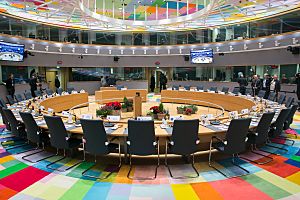 |
|||||||||||||||||||||||||||||||||||||||||||||||||
| Europa building Brussels, Belgium |
|||||||||||||||||||||||||||||||||||||||||||||||||
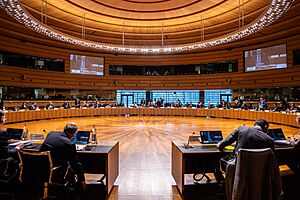 |
|||||||||||||||||||||||||||||||||||||||||||||||||
| European Convention Center Luxembourg City, Luxembourg |
|||||||||||||||||||||||||||||||||||||||||||||||||
| Constitution | |||||||||||||||||||||||||||||||||||||||||||||||||
| Treaties of the European Union | |||||||||||||||||||||||||||||||||||||||||||||||||
The Council of the European Union, often called simply the Council, is one of the main groups that help run the European Union (EU). It is one of two bodies that make laws for the EU. The Council works with the European Parliament to check and approve new ideas for laws. These ideas usually come from the European Commission.
The Council of the European Union is special because it is made up of representatives from each EU country's government. These can be ministers or even ambassadors. They come together to share their country's views.
The Council meets in 10 different groups, called "configurations." Each group has one minister from each EU country. The ministers who attend depend on the topic being discussed. For example, if they are talking about farming, the agriculture ministers from each country will meet.
Contents
How the Council Works
Who Leads the Council?
The job of leading the Council changes every six months. A different EU country takes a turn. The ministers from that country lead the meetings and help set the daily plans. To keep things running smoothly, three countries often work together for 18 months. They share common goals. However, the group that deals with foreign affairs is always led by the EU's High Representative.
How Decisions Are Made
When the Council makes decisions, they usually vote. Most decisions need a "qualified majority." This means a certain number of countries and a certain percentage of the EU's population must agree. For some very important topics, all countries must agree (unanimity). For simple tasks, a simple majority is enough.
Often, the Council and the European Parliament must both agree for a new law to pass. This is called the "ordinary legislative procedure." It means they share power equally when making laws and deciding on the EU's budget.
The Council's Support Team
The General Secretariat of the Council of the European Union is like the Council's helpful staff. They prepare for meetings, write reports, translate documents, and manage the daily plans. This team is led by the Secretary-General.
History of the Council
The Council started a long time ago with the European Coal and Steel Community (ECSC). It was first called the "Special Council of Ministers." Its job was to balance the power of another group, the High Authority. Over time, as new European communities were formed, new Councils were created.
In 1965, there was a big disagreement called the "empty chair crisis." France stopped attending Council meetings because of problems with new farming ideas. This stopped the Council's work for a while. The problem was solved the next year. This event showed that the Council's way of working needed improvements.
In 1967, different Councils merged into one: the "Council of the European Communities." Later, in 1993, it became the "Council of the European Union." Over the years, the European Parliament gained more power. This meant the Council had to share its law-making duties more and more.
The Treaty of Lisbon, which came into effect in 2009, made more changes. It gave even more power to the Parliament. It also made the European Council a separate group. The different Council groups (configurations) were also officially named in the treaties for the first time.
What the Council Does
Making EU Laws
The main job of the Council is to be one of the two groups that can approve or reject new laws for the EU. The other group is the European Parliament. New law ideas usually come from the European Commission.
The Council also helps decide the EU's budget, which is about 155 billion euro. It also has a big say in areas like foreign policy and how EU countries manage their economies. Some people think of the Council as being like an "upper house" in a country's parliament.
The Council also plays a part in choosing the President of the European Commission.
How Laws Are Made: Step-by-Step
Making laws in the EU involves the Council, the Parliament, and the Commission. Most laws are made using the "ordinary legislative procedure." This means both the Council and the Parliament must agree for a law to pass.
Here's how it generally works:
- The Commission suggests a new law to the Parliament and the Council.
- The Parliament can suggest changes. If the Council agrees, the law is approved.
- If the Council doesn't agree, it suggests its own version to the Parliament.
- The Parliament can then approve it, or suggest more changes.
- If they still don't agree, a special "Conciliation Committee" meets. This committee has members from both the Council and the Parliament.
- If they find a common text, both the Council and Parliament must approve it. If not, the idea for the law is dropped.
There are different types of EU laws:
- A regulation is a law that applies directly and fully in all EU countries.
- A directive sets goals for EU countries to reach. Countries can choose how they reach these goals through their own laws.
- A decision is for a specific person or group and applies directly.
- The Council can also give recommendations and opinions. These are just suggestions and are not legally binding.
When the Council votes, they usually use "qualified majority voting." This means at least 55% of the member states must agree. These countries must also represent at least 65% of the EU's total population. A small group of at least four countries can block a decision.
Council Resolutions
Sometimes, the Council issues "resolutions." These are not laws and do not have legal power. They are usually used to plan future work in a certain area or to ask the Commission to take action.
Foreign Affairs
The Council plays a big role in the EU's foreign policy. This includes things like defining how the EU deals with other countries or regions. For example, they might agree on a "common position" about human rights in a certain country. Once agreed, all EU countries must follow this policy.
For foreign affairs, the Council usually needs all countries to agree (unanimity). However, there are some exceptions where a qualified majority vote is allowed. For example, in late 2023 and early 2024, there were discussions about aid to Ukraine. The Council worked together to reach an agreement.
Budget Decisions
The Council and the Parliament together decide on the EU's budget. If they disagree on the budget, they work it out in a special committee. If they still can't agree, the Parliament can make the final decision on the budget. The Council also helps coordinate how EU countries manage their economies.
How the Council Is Organized
The Presidency
The Presidency of the Council is not one person. It is held by an EU country's government for six months. The countries take turns in a set order. Since 2007, three countries often work together as a "trio" for 18 months. They share common goals, even though only one country officially holds the Presidency at a time. The foreign affairs meetings are an exception, as they are led by the High Representative.
The Presidency's job is to manage the Council's work. This includes calling meetings and guiding the work of different committees. It also involves helping to solve problems and setting the Council's agenda. This gives the country holding the Presidency a lot of influence. The Presidency also represents the Council within the EU and on the world stage.
Different Council Groups
The Council is legally one body, but it works through different groups called "configurations." Each group deals with a specific area. For example, the "Agriculture and Fisheries" group is made up of the agriculture and fisheries ministers from each country. The minister from the country holding the Presidency leads that group's meetings.
As of 2020, there are ten main groups:
- General Affairs (GAC): This group coordinates all the Council's work. It also prepares for meetings of the European Council.
- Foreign Affairs (FAC): Led by the High Representative, this group handles the EU's foreign policy, defense, trade, and development. It sometimes meets to discuss defense specifically.
- Economic and Financial Affairs (Ecofin): This group includes the finance ministers from each country. It deals with the EU budget and matters related to the eurozone.
- Agriculture and Fisheries (Agrifish): This group includes agriculture and fisheries ministers. They discuss farming, fishing, forestry, food safety, and more.
- Justice and Home Affairs (JHA): This group brings together justice and interior ministers. It also covers civil protection.
- Employment, Social Policy, Health and Consumer Affairs (EPSCO): This group includes ministers for employment, social protection, consumer rights, health, and equal opportunities.
- Competitiveness (COMPET): This group was formed in 2002. It includes ministers for industry, tourism, research, and space policy.
- Transport, Telecommunications and Energy (TTE): This group also started in 2002. It covers transport, communication, and energy topics.
- Environment (ENVI): This group is made up of environment ministers. They meet about four times a year.
- Education, Youth, Culture and Sport (EYCS): This group includes ministers for education, culture, youth, and sport. They meet a few times a year.
There is also the Political and Security Committee (PSC). It brings together ambassadors to watch international situations and set policies, especially during crises.
The European Council is similar but separate. It is made up of the leaders of each EU country (like presidents or prime ministers). It has its own permanent President, Charles Michel, since 2019. Its job is to set the overall direction for the EU.
Administration and Support
The General Secretariat of the Council of the European Union is the permanent support system for the Council. They prepare meetings, draft reports, translate documents, and manage agendas. The Secretary-General leads this team.
The Committee of Permanent Representatives (COREPER) is a group of representatives (like ambassadors) from each EU country. They meet every week to prepare the Council's work. They also work with the Parliament on new laws.
Where the Council Meets
The Council's main home is in Brussels, Belgium. However, in April, June, and October, it holds its meetings in Luxembourg City.
The Council has moved its offices several times over the years. Since 1995, it has mainly used the Justus Lipsius building in Brussels. In 2017, both the Council of the European Union and the European Council started using the new Europa building as their official headquarters. This building is next to the Justus Lipsius building. The unique "lantern" shape of the Europa building's main meeting room is even part of the official logos for both EU groups.
When the Council meets in Luxembourg City, it uses the Kirchberg Conference Centre. Sometimes, the Council also meets in other cities or even outside the EU for special talks.
Images for kids
See also
 In Spanish: Consejo de la Unión Europea para niños
In Spanish: Consejo de la Unión Europea para niños
 | Kyle Baker |
 | Joseph Yoakum |
 | Laura Wheeler Waring |
 | Henry Ossawa Tanner |


